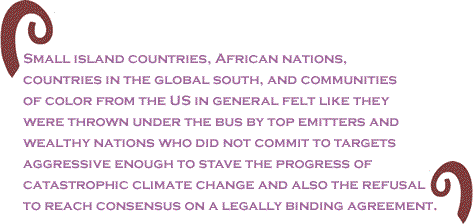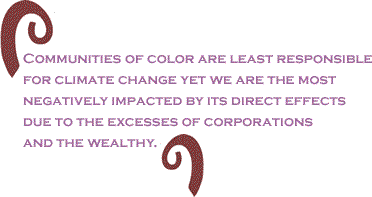
|
||||||||||||||||||||||
|
||||
 |
||||
How many of us in black communities in the US watching CNN and other media house coverage of the UN Framework Convention on Climate Change (UNFCCC) Conference of Parties 15(COP15) in Copenhagen in December would glean any sense that our communities are going to be the hardest hit in the US, by the impacts of climate change? Unfortunately very few.� Yet out of the 20,000+ people participating in the melee, there was a stalwart contingent of intrepid folks there on behalf of our communities to advocate for our rights. Folks from Advocates for Environmental Human Rights, the Joint Center for Political and Economic Studies, Bennett College, the NAACP, 100 Black Men of Atlanta, Morehouse University, the Environmental Justice and Climate Change Initiative, the Hip Hop Caucus, etc came with the agenda of representing the interests of black communities from the United States. The
issues we raised were many and we framed our analysis within a broader
environmental justice/ecology justice framework as climate, the
environment generally, the economy, racism, and how we live, are
all inextricably connected.� Communities of color are least responsible
for climate change yet we are the most negatively impacted by its
direct effects due to the excesses of corporations and the wealthy.�
According to the Environmental Justice and Climate Change Initiative
race is the #1 determinant of the placement of toxic Activities in which we engaged at the COP 15 ranged from organizing meetings, to protests, to press conferences, in addition to presentations at official and satellite events. Members of the African American contingent joined with the Pan African Climate Justice Alliance to hold a joint press conference calling on President Obama to commit to aggressive targets for climate change mitigation and adaptation. Similarly, a group of community of color activists, organized by Movement Generation for Change, gathered in front of the US Embassy in Copenhagen to hold a press conference to reiterate this message.� Planning meetings were held to strengthen South-North linkages between global south movements and communities of color representing �the south within the north�, as many of us have named ourselves.� We also took the opportunity of being gathered together in Copenhagen to meet as the US communities of color and talk about strategy for advancing climate justice within the US, such as upcoming organizing opportunities with the US Social Forum 2010. The NAACP presented at satellite events hosted by the Women�s Environment and Development Organization, as well as the National Wildlife Federation to ensure that our stories, perspectives, and demands were being represented in as many spaces as possible. The African American contingent also participated in the People�s Assembly at the Klimaforum (an alternative space for activists) and several peaceful demonstrations which protested the lack of democracy in the official talks. (The NAACP Climate Justice Initiative blog provides a daily account with pictures and video of the 2 weeks of the climate talks.)
The outcomes of the Copenhagen talks were not as civil society or global south governments deemed fair and just. Though an accord was reached, small island countries, African nations, countries in the global south, and communities of color from the US in general felt like they were thrown under the bus by top emitters and wealthy nations who did not commit to targets aggressive enough to stave the progress of catastrophic climate change and also the refusal to reach consensus on a legally binding agreement.� The refrain from African civil society groups, referring to the low level of commitment for reducing global warming was, �Two Degrees is Suicide�. Issues including gendered dimensions of climate change, and the situation of communities of color in the global north were largely swept under the carpet and received little to no attention in the official proceedings. It seemed to those of us there with a justice agenda that many were more concerned with protecting corporate interests and excessive lifestyles, than making life saving changes in how societies function for the well-being and benefit of all.� From Bolivia regarding who is responsible for fixing the situation in which we find ourselves as a planet, due to our excesses, �You break it. You buy it.� Introducing the concept of �climate debt� and clearly indicating that those who have perpetrated earth-damaging practices, must bear the bulk of the burden for its repair.� We have a lot of work to do to hold governments accountable! Moving forward we must build alliances with other affected communities in the US and abroad to advance a just transition towards climate justice that is within an ecology justice frame that encompasses economy, environment, racial and gender justice, indigenous rights, etc.� Critical community level work must be done towards advancing models of local self reliance, resistance, and resilience. Opportunities for cross-community and cross-movement organizing include the US Social Forum 2010 in June occurring in Detroit Michigan, which also connects to regional and world social forums for cross-border linkages.� The next COP will occur in Mexico City sometime in 2010 and civil society is already organizing to ensure that the outcomes from this meeting are legally binding and include aggressive targets that will uphold the rights to health, home, sovereignty, and well-being for communities and countries globally. BlackCommentator.com Guest Commentator Jacqui Patterson, a lifelong community practitioner and social justice activist specializing in the areas of public health, women�s rights, economic justice and racial justice, is the Co-Founder and Coordinator of Women of Color United and the Director of the NAACP Climate Justice Initiative. She also serves on the Boards of Directors for the Institute of the Black World and Health GAP and on the Steering Committee of the National Association of Black Social Workers, ATHENA, and the Congressional Black Caucus Fellows Alumni Network. Click here to contact Ms. Patterson. |
||||
 |
||||
If you would like to comment on this article, please do so below. There is a 400 character limit. You do not need a FaceBook account. Your comment will be posted here on BC instantly. Thanks. Entering your email address is not mandatory. You may also choose to enter only your first name and your location.
|
||||
Thank you very much for your readership. |
||||
| Any BlackCommentator.com article may be re-printed so long as it is re-printed in its entirety and full credit given to the author and www.BlackCommentator.com. If the re-print is on the Internet we additionally request a link back to the original piece on our Website. | ||||
| |
||||
Issue 357 |
| Executive Editor: Bill Fletcher, Jr. |
| Managing Editor: Nancy Littlefield |
| Publisher: Peter Gamble |
| Est. April 5, 2002 |
| Printer Friendly Version in resizeable plain text format |
 |
 |

|
 |
| |
| |













































